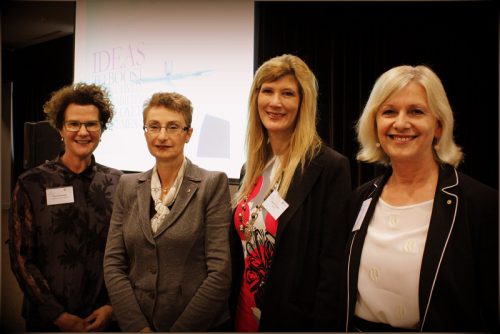IT’S not every day there’s the opportunity to sit down with four inspiring Australian business leaders, but a Canberra audience was recently treated to a conversation with a panel of leading female thinkers and business identities.

The panelists at a recent Property Council lunch – Carol Schwartz, founding chair of the Women’s Leadership Institute Australia; Deborah Page, chairman, Investa Office Fund; Annabelle Pegrum, director of PegrumJudd, and Lynne Pezzullo, director of Deloitte Access Economics – responded to questions across the wide array of issues related to diversity in the workplace.
Asked why there were not more women in leadership roles, the panel agreed that the system continues to be flawed.
“This is not a problem with women,” said Carol, noting that more than 55 per cent of university graduates were female. She supported the Business Council of Australia’s target for equal representation of gender in senior management roles, rallying against acceptance of the status quo.
Targets were important, she said, because we’ve made so little progress in 30 years. She stressed that quotas and merit were not mutually exclusive – “there is no way that a board would appoint the wrong person just because she is a woman”.
Increasingly, flexible work arrangements were key to allowing women to reach the top.
Deborah recalled her experience of being 12 weeks’ pregnant when offered a partnership in a major accounting firm and the difficulties of having to return to full-time work just four weeks after the birth.
“When my daughter is in the same situation, I hope she can come back to work on her own terms,” she said, emphasising that time could be just as important as money.
More women in senior roles could give better commercial outcomes, said Annabelle.
“In my experience, working with creative multi-disciplinary teams, you get the best outcomes when there is a diversity of ideas,” she said, also advising women not to lose their individual voice once they got a seat at the board table.
The panel agreed that mentoring and sponsorship were crucial tools that organisations could use to encourage women to achieve senior positions and each shared personal moments of where and how mentors had helped them.
“It’s important for women to have male as well as female mentors,” Lynne said. This provided women with a full spectrum of advice to fuel their path to success. Guidance needed to be coupled with positive affirmation. Women needed to be supported and told when they were doing a good job. “Just don’t pat us on the head!” she said.
Catherine Carter is ACT executive director of the Property Council of Australia
Who can be trusted?
In a world of spin and confusion, there’s never been a more important time to support independent journalism in Canberra.
If you trust our work online and want to enforce the power of independent voices, I invite you to make a small contribution.
Every dollar of support is invested back into our journalism to help keep citynews.com.au strong and free.
Thank you,
Ian Meikle, editor




Leave a Reply